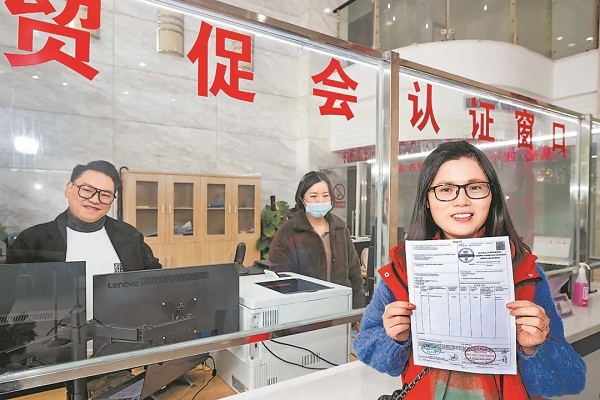中文 |

RCEP Benefits Fujian Companies
Source: chinadaily.com.cn | 2022-01-07 16:16 Click:

The CCPIT Fujian Sub-Council issues its first RCEP certificate of origin to Fujian Jianteng Trading Co in Fuzhou, Fujian province on Jan 1.
Fuzhou Customs issued its first Regional Comprehensive Economic Partnership (RCEP) certificate of origin at midnight Jan 1, which was the date that the RCEP agreement took effect in China, Japan, Australia, New Zealand, and six ASEAN member countries (Brunei, Cambodia, Laos, Singapore, Thailand, and Vietnam).
The certificate was issued to a batch of wooden furniture, which will be exported to Australia by Mujia, a Fuzhou-based wooden crafts manufacturer.
The wooden furniture amounted to $77,000, and the RCEP certificate of origin is expected to help reduce tariffs for the company by 24,000 yuan ($3,772.48) in Australia.
Thanks to the RCEP, more than 90 percent of the trade in goods among the member countries will eventually become tariff-free, further facilitating China's participation in fair international competition, lowering costs for foreign trade companies, and enhancing the international competitiveness of products.
To enjoy lower or zero tariffs, the RCEP's new rules of origin allow for products to have just 40 percent of their value added within the region. The rules of origin determine if a product originates from a member so that related provisions can be applied.
Another wooden crafts manufacturer, Fujian Jianteng Trading Co, received the first RCEP certificate of origin issued by the China Council for the Promotion of International Trade (CCPIT) Fujian Sub-Council. With the certificate, the company's exported wooden products to Japan can enjoy a preferential tariff of 2.5 percent.
In addition, Quanzhou Justsun Supply Chain Co, a company that focuses on exporting bulk commodities like clothing, shoes and hats, and electronics, became the province's first approved exporter following the Administrative Measures for the Approved Exporters, which is a vital measure to facilitate the recognition of certificates of origin.
As an approved exporter, the company is able to issue certificates of origin by itself, which have the same validity as the ones issued by customs, in order to arrange product production and exporting in a more flexible manner.